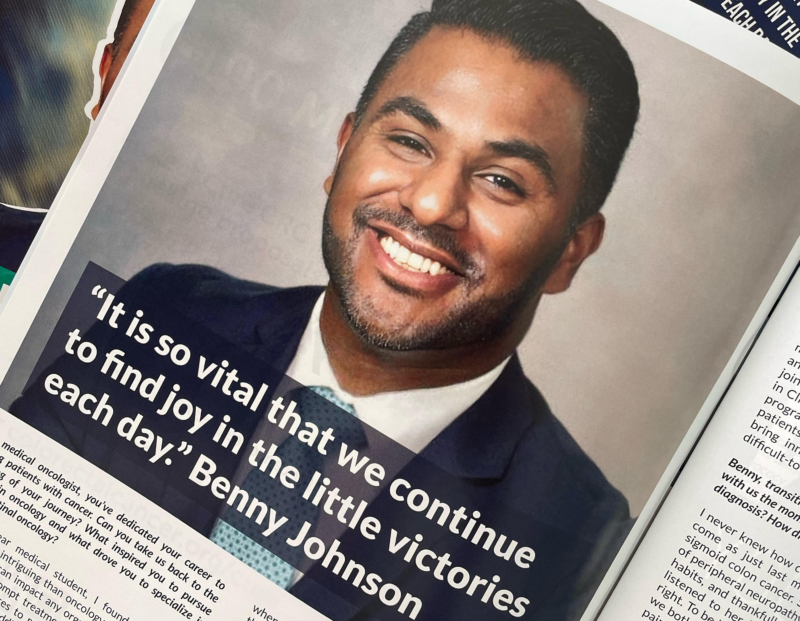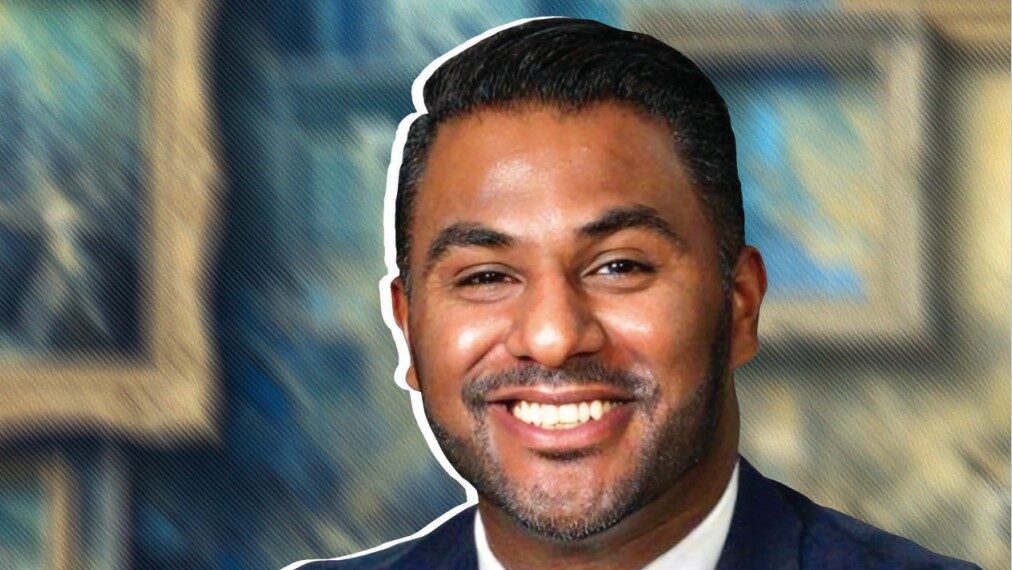The new issue of OncoDaily Magazine had the privilege to feature an exclusive interview with Dr. Benny Johnson, Senior Medical Director at Agenus, discussing his career and dedication to oncology, his motivation, professional vision for emerging treatments and personal experiences with cancer.
Who is Benny Johnson?
Dr. Benny Johnson is the senior medical director at Agenus. Previously, Dr. Benny Johnson, was an Assistant Professor in the Department of Gastrointestinal Medical Oncology, Division of Cancer Medicine, at The University of Texas MD Anderson Cancer Center. He completed his fellowship in gastrointestinal malignancies from Mayo Clinic and Internal Medicine residency from Geisinger Commonwealth School of Medicine.
Dr. Johnson’s clinical practice focuses on the management of patients with lower gastrointestinal malignancies, specifically colorectal and anal cancer. His research interests focus on identifying novel targets coupled with innovative clinical trial design for the treatment of rare and aggressive molecular subtypes of metastatic colorectal cancer.
He has co-authored many peer-reviewed original research articles in addition to abstracts, and editorials. Dr. Johnson is a member of the American Society of Clinical Oncology and American Association for Cancer Research.

“As a medical oncologist, you’ve dedicated your career to treating patients with cancer. Can you take us back to the beginning of your journey? What inspired you to pursue a career in oncology and what drove you to specialize in gastrointestinal oncology?
As a third-year medical student, I found no area of medicine more intriguing than oncology. This was mainly because cancer can impact any organ site. Thus, there is a criticality to prompt treatment of the primary tumor as well as metastases to maintain and preserve normal patient function, in addition to achieving disease control and, in certain instances, a cure. Furthermore, the need to appreciate underlying carcinogenic pathways and molecular genetics to generate successful therapies and meaningful drug development was academically fulfilling.
However, it was not until my fourth year of medical school, when my mother was diagnosed with pancreatic cancer, that pursuing a career in oncology seemed to be more of a calling. I was thrust into representing our family in crucial decision-making, interacting with Mom’s internal medicine physicians and oncologists, and coordinating second opinions.
During this season, like most families, our family did not have much time to process all that was happening with the emergence of a life-threatening diagnosis. Still, we had to continue to move swiftly to ensure the proper care was accessible for Mom.
Once we identified the right treatment team, I witnessed firsthand what patient- centered, family-focused, evidence-based medical and oncologic surgical care looked like and how impactful that was for our family, especially for my mom. Thus, these early interactions with empathic and knowledgeable clinician- researchers ultimately provided the stepping stones for a personal decision to focus on gastrointestinal oncology and clinical investigation in my career path.
Over the last six years, I have worked as a GI oncologist at MD Anderson Cancer Center, where my clinical and research focus has been colorectal cancer. As a GI oncologist, I have had the privilege to take care of many patients and their families, walking alongside them as they battle colorectal cancer so valiantly with chemotherapy, surgery, immunotherapy, and novel investigator-initiated clinical trials. Additionally, due to the rise in early-onset colorectal cancer both in the United States and globally, I painfully watched my patients shift to essentially becoming peers in similar stages of life.
I wondered how they were balancing colorectal cancer and all their treatment while still managing parenthood, marriage, and busy careers. I greatly admired each of them, and their courageous stories remain with me today. When I joined Agenus six months ago as a Senior Medical Director in Clinical Development focused on our colorectal cancer program, this context and previous experience caring for patients fueled my work as I partnered with our team to bring innovative immunotherapies to the forefront for difficult-to-treat cancers, especially colorectal cancer.
Benny, transitioning to your personal journey, can you share with us the moment you first learned about your wife’s cancer diagnosis? How did you both initially cope with the news?
I never knew how close to this disease I would eventually come as just last month; my wife was diagnosed with sigmoid colon cancer. She was dealing with a few months of peripheral neuropathy, fatigue, and change in her bowel habits, and thankfully, she sought out care promptly. She listened to her body and knew something was just not right. To be honest, while she was undergoing her workup, we both feared the worst, but that in no way numbed the pain when the GI endoscopist shared the words, ‘We found cancer in your colon.’ I remember immediately feeling the weight on my shoulders that, from that moment on, our lives would never be the same, and unfortunately, that is very true.
As a medical oncologist, you have a unique perspective on cancer care, but when it became personal with your wife’s diagnosis, how did your professional knowledge intersect with your role as her spouse and caregiver?
My background as a GI oncologist has provided a framework for me to stay in the details of every conversation my wife’s care providers have with her. Initially, we both felt this was extremely helpful to navigate complex treatment decision- making as a family in a very short period. However, as we continue our journey, I must remember to step back from an exhaustive treatment plan focus so that I understand what she truly needs from me in the moment as her spouse and caregiver, my new primary role. This is much harder than it seems.
What motivated you to explore the option of enrolling her in a clinical trial rather than pursuing conventional treatment options? Clinical trials are often accompanied by uncertainty and hope for patients and their families. How did you manage your own expectations and emotions while also providing support to your wife during this uncertain time?
This was a challenging decision. We discussed in detail that standard-of-care treatments have been tried and tested, and I offered these treatments with confidence to many of my patients if a clinical trial was not readily available. However, we also reviewed the known limitations of traditional chemotherapy in managing colorectal cancer.
If you can have access to a novel clinical trial that makes sense, you should pursue it. In our situation, there were logistical considerations that needed to be thought through and side effects unique to the trial drugs that she needed to understand. As her husband and advocate, I just wanted to offer her all the options and ultimately let her make the best decision for her.
How has your wife’s participation in the clinical trial influenced your view of cancer treatment’s future and the impact of innovative therapies on patient outcomes? Amidst the challenges of cancer treatment, how did you both find moments of joy and connection, and how did these moments
shape your journey?
I am incredibly proud of her willingness and bravery to enroll in a clinical trial, appreciating how scary it must have been for her to decide while still processing the diagnosis of early- onset colon cancer and simultaneously understanding the nuances of experimental therapy. However, as a physician assistant, she was able to appreciate the available data, the excitement of a novel immunotherapeutic approach for colorectal cancer, and its potential for her and future patients. Watching her in real time also provided a new depth of admiration for her as she withstands such a difficult diagnosis with grace and fantastic resolve.
While we are still very early on, watching my wife go through this journey and conquer small battles each day has provided immense hope that we have innovative options coming down the pike for our patients. This will be a hard road for us, and like many others who’ve walked this road before us, we acknowledge that. However, it is so vital that we continue to find joy in the little victories each day. We have been saying to each other simply to ‘take it one day at a time’.
Looking back on your journey, what advice would you offer to other caregivers who are supporting a loved one through a cancer diagnosis, particularly in terms of maintaining hope and finding moments of joy amidst hardships?
Even though this is all new for us, I have a few pieces of advice for caregivers. I think the most important thing is to admit how hard this is. Just admit it. You gain nothing by pretending you have it all figured out. There is nothing like having a cancer diagnosis in your family, and aside from the physical impact, the emotional impact can be just as significant. Please take time to be honest with your loved one, to provide a space for them to do the same with you, and to deal with your emotions in a healthy way.
That may mean being vulnerable with friends, family, and church, and seeking more formal help from a medical professional like a therapist. I think one way to maintain hope during such a difficult time is to remember the journey is genuinely purposeful and each moment matters- find ways to celebrate your loved one daily.”
By Gevorg Tamamyan, the Editor-in-chief of OncoDaily, Chairman and Professor of the Department of Hematology and Pediatric Oncology at Yerevan State Medical University, CEO of the Immune Oncology Research Institute, President-Elect of the International Society of Pediatric Oncology Asia Continental Branch (SIOP Asia) the Pediatric Oncology East and Mediterranean (POEM) Group.


